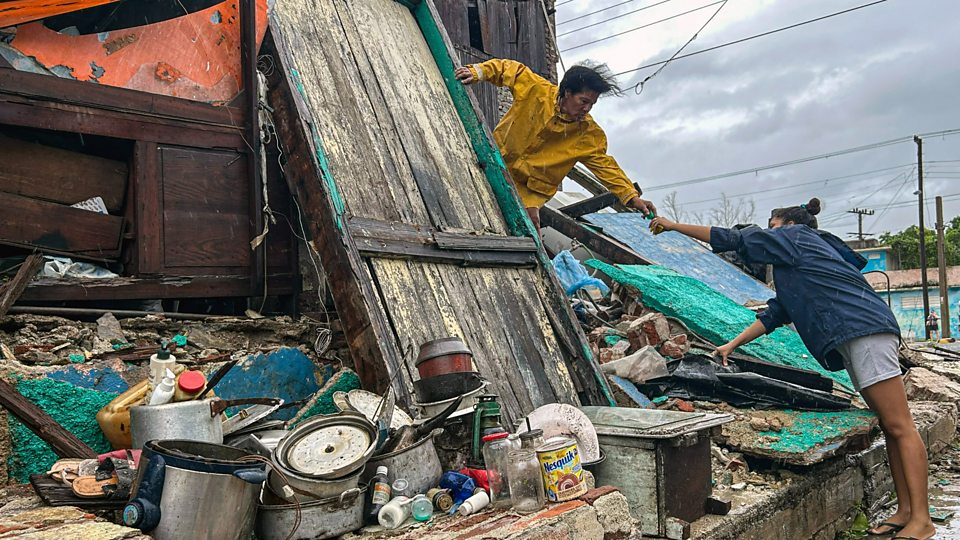Watch: BBC reporter in Jamaica 'feels anxiety in chest' as Melissa hitspublished at 23:00 GMT 28 October
We can bring you latest video sent to us by Nick Davis, a BBC reporter in Kingston:
Four people are confirmed dead in Jamaica while at least 20 others have died in Haiti in flooding as a result of Hurricane Melissa
The hurricane made landfall on Tuesday as a category five storm in Jamaica, where people remain stuck on roofs and without power
Jamaican Prime Minister Andrew Holness vows to devote "all our energy" to a strong recovery
The town of Black River, the PM says, is "totally destroyed" - one woman tells the BBC she hasn't been unable to reach her aunt there, saying: "I know something is not right"
Hurricane Melissa, now a category one storm, is expected to bring violent winds and heavy rainfall when it reaches The Bahamas in the next few hours - it will then make its way to Bermuda on Thursday
Are you in the path of the hurricane? Get in touch via email, external or WhatsApp +44 7756 165803, external
Edited by Oliver O'Connell and Brandon Livesay, with reporting from Nick Davis in Jamaica and Brandon Drenon in Miami
We can bring you latest video sent to us by Nick Davis, a BBC reporter in Kingston:
We're hearing more about what it's like for people on the ground in Jamaica as the storm continues, and how difficult they expect recovery efforts to be.
Tamisha Lee is in Mandeville, where she is seeing heavy rain, powerful winds, objects flying through the air, and darkness as the electricity has gone out. Lee is the president of the Jamaica Network of Rural Women Producers (JNRWP), a partner of humanitarian organisation CARE International, which will be helping with the recovery effort.
"I am feeling anxious and tense, but I am focused. The fear is real, but our preparation is helping us manage that fear," she says.
The post-storm recovery will be a marathon, not a sprint, Lee says. With a lot of infrastructure damage expected, making roads impassable, Lee says JNRWP will have a difficult time delivering aid to its members. And without electricity, communication will be a struggle too, she adds.
"Based on the forecast and what we have been experiencing since Sunday evening, I am anticipating the damage will be enormous."
Volunteers for the Global Empowerment Mission charity have been filling boxes of essential goods to send to affected areas.
The boxes, which they are preparing at the group's headquarters in Miami, Florida, contain drinking water, preserved meat, canned soups and stews:
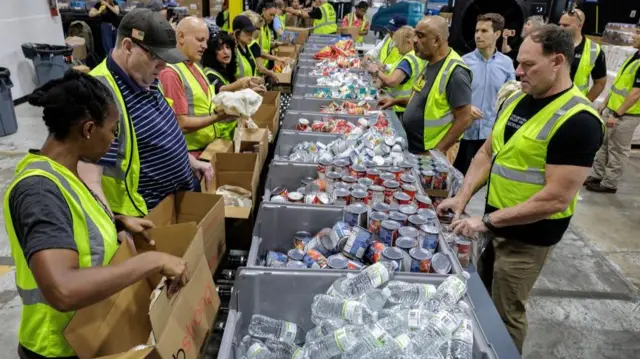 Image source, EPA
Image source, EPA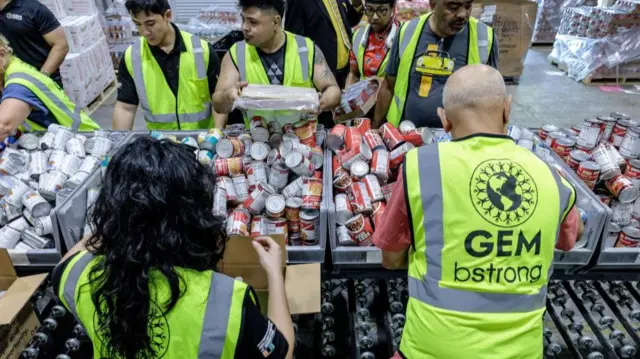 Image source, EPA
Image source, EPAEarlier we spoke to Kyle Holmes, from Bolton, who is visiting Jamaica with his wife and young daughters, aged 7, 10, and 12, for a family wedding.
He said the windows and balconies of the hotel he was staying in - the Grand Palladium Resort, in the town of Lucea - had started to rattle and "everything was smashing against the building".
The hotel now looks like "a disaster zone" said Holmes, who added his family are now safe after the "worst experience ever".
He says he has barricaded the windows to the hotel room by placing all the furniture against them.
"We were supposed to be flying back tomorrow afternoon at 15:30," he told BBC Manchester radio.
"But the president of the airport has said it won't be open until Thursday.
Our reporter Dan Wareing has the full story here.
 Mark Poynting
Mark Poynting
Climate reporter
Globally, the frequency of tropical cyclones has not increased over the past century, and in fact the number may have fallen, external - although long-term data is limited in some regions.
But it is "likely" that a higher proportion of tropical cyclones across the globe are reaching category three or above, meaning they reach the highest wind speeds, according to the UN's climate body, the IPCC, external.
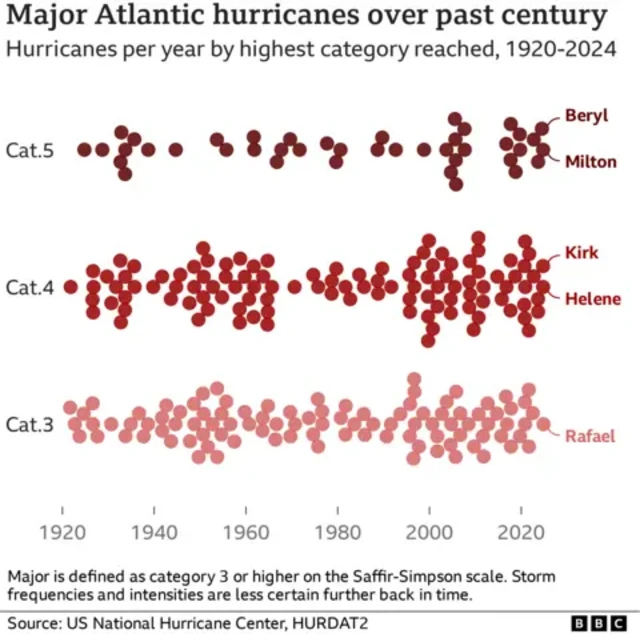
The IPCC quotes "medium confidence" that there has been an increase in the average and peak rainfall rates associated with tropical cyclones.
The frequency and magnitude of "rapid, external intensification events" in the Atlantic has also likely increased, external. This is where maximum wind speeds increase very quickly, which can be especially dangerous.
There also seems to have been a slowdown in the speed at which tropical cyclones move, external across the Earth's surface. This typically brings more rainfall for a given location. For example, in 2017 Hurricane Harvey "stalled" over Houston, releasing 100cm of rain in three days, external.
In some places, the average location where tropical cyclones reach their peak intensity has shifted poleward - for example the western North Pacific, external. This can expose new communities to these hazards.
And there is some evidence, external the increased intensity of US hurricanes means they are causing more damage.
Heavy rainfall and damaging winds will continue affecting the majority of the island through the night, with an additional six to 12 inches of rain possible, Mike Brennan, the director of the US National Hurricane Center tells BBC News.
But even after the storm passes over the island, the "flooding risk, and just the post storm environment in Jamaica, is going to be extremely dangerous with widespread trees and power lines down, significant structural damage", Brennan says.
It's going to remain a very dangerous environment - particularly in the western part of the country and in the mountains - "for days, if not weeks, to come", Brennan says.
We've just been sent these photos from Moon Palace in Ochos Rios, a coastal town in north Jamaica.
Damage wrought by the hurricane has caused some of the ceiling to collapse in an area where guests are sheltering.
In other parts of the island water has risen up to the roofs of buildings.
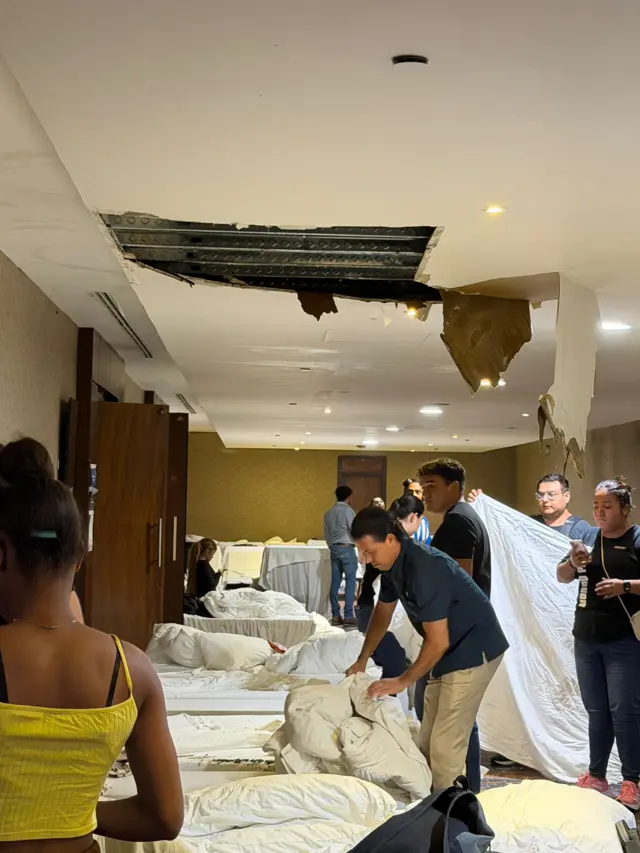 Image source, Richard
Image source, RichardPeople remove bed linen from a room where the ceiling has collapsed due to Hurricane Melissa.
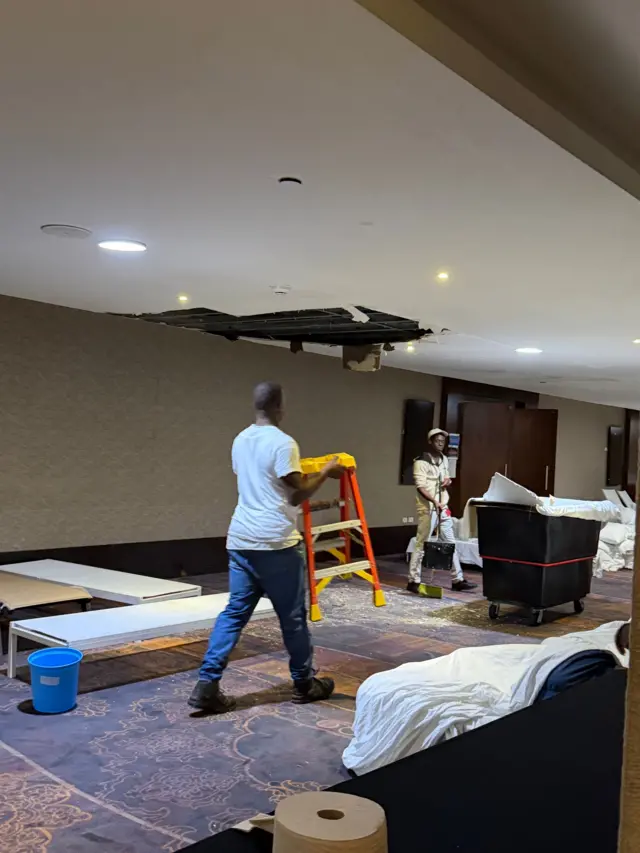 Image source, Richard
Image source, RichardThe beds have been removed and a laundry trolley is being used to transport bits of ceiling.
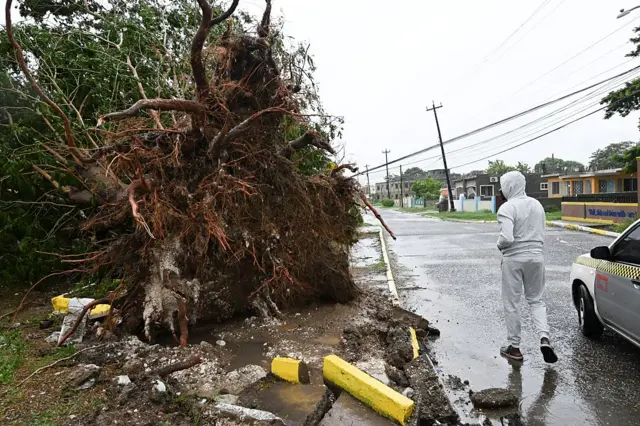 Image source, Getty Images
Image source, Getty ImagesWe can now bring you the latest update from the US National Hurricane Center (NHC), which has been tracking Hurricane Melissa.
The hurricane's maximum wind speed is now expected to be around 145 mph (230km/h) and it will move from the west towards Jamaica's northeast.
"Damaging winds will continue across portions of Jamaica through this evening, especially in mountainous areas," the NHC says. "Remain in a safe shelter in Jamaica through tonight."
"Melissa is expected to reach southeastern Cuba as an extremely dangerous major hurricane, and it could still be a major hurricane when it moves across the southeastern Bahamas," the NHC adds.
US hurricane hunting planes will be out later tonight to gather more information about Melissa's path.
Dramatic videos out of Jamaica show the early impacts of Hurricane Melissa, one of the strongest storms ever recorded.
Videos show strong wind forces in Kingston, in the south, and swaying tree and flying debris in Montego Bay in the north of the island nation.
Melissa has been downgraded to category 4, but it still presents a dangerous situation.
Strong winds and flying debris as Hurricane Melissa makes landfall
Some hospitals on the south coast of Jamaica have had their roofs torn off, former Jamaican senator Imani Duncan-Price tells BBC News.
"We have some solid structures, but some structures, because we are a developing country, are not as sturdy."
A hospital in Saint Elizabeth, Duncan-Price says, had to move some patients up to higher floors because of previous damage the structure had sustained in Hurricane Beryl last year.
The winds have been so strong in some parts of the country that "no structure" could withstand them, she says.
In Mandeville, for example, water has risen up to the roofs of houses, Duncan-Price says.
"People are trying to rescue people in the middle of the storm just to save lives."
As Melissa continues to batter Jamaica, across the Caribbean to the north, residents of the southern Cuban city of Santiago de Cuba are evacuating to higher ground.
Some are staying behind, trying to secure roofs and fences, while stockpiling drinking water.
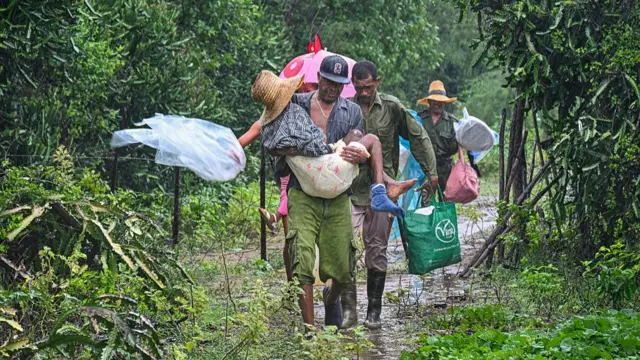 Image source, Getty Images
Image source, Getty Images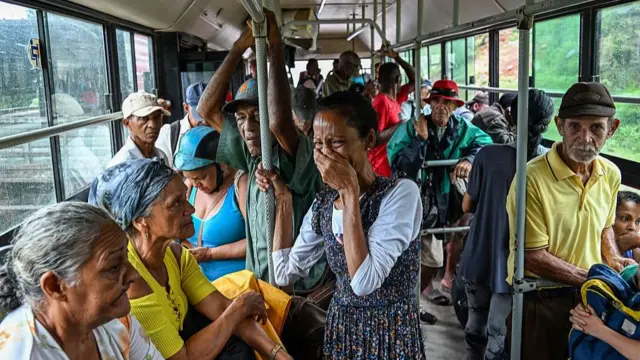 Image source, Getty Images
Image source, Getty Images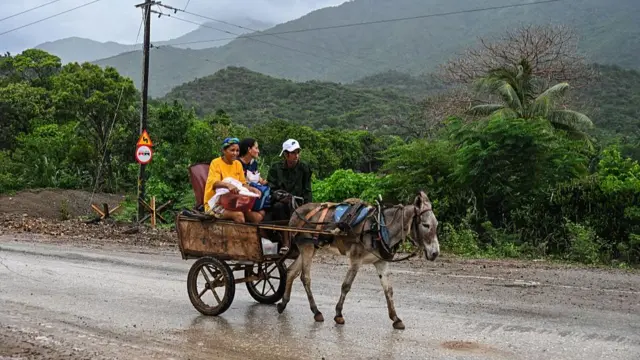 Image source, Getty Images
Image source, Getty Images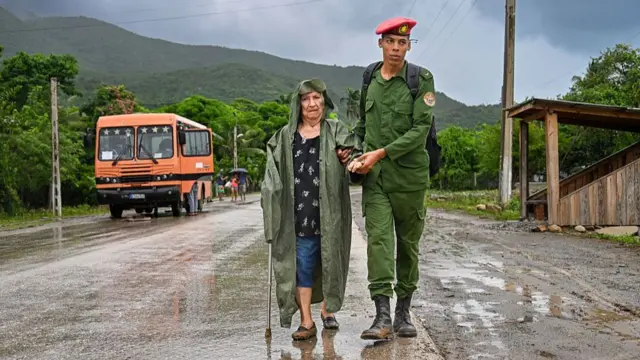 Image source, Getty Images
Image source, Getty Images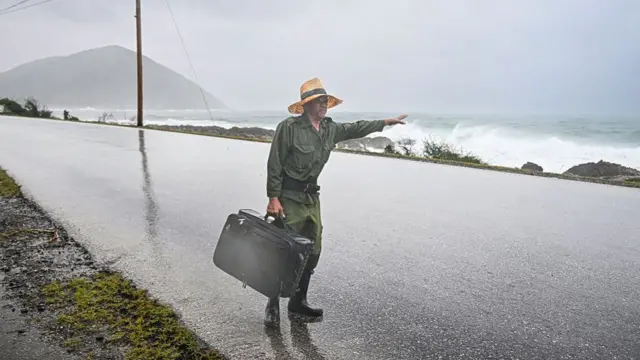 Image source, Getty Images
Image source, Getty Images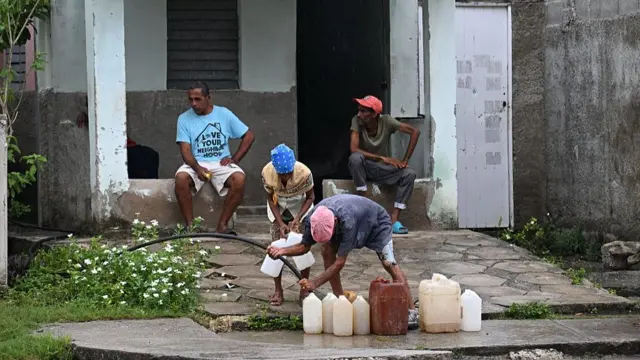 Image source, Getty Images
Image source, Getty Images Brandon Drenon
Brandon Drenon
Winston Warren has been riding out the hurricane from inside his home in east Kingston with his wife and father.
I asked him to describe what it's like when a category 5 hurricane comes barreling past your doorstep.
Warren, who says he lives less than 1km from the ocean, describes the sound as "a constant roar of water".
"There are times you just wonder - are the waves going to come crashing into your house," he says.
"We've seen a lot of roofs blown off," he continues.
Warren says he believes he has escaped the worst of the impact, having taken the necessary precautions, like trimming the branches on the mango trees in his yard days ago.
Hurricane Melissa and the resulting flooding may displace crocodiles from their natural dwellings, Jamaican health officials say.
"Rising water levels in rivers, gullies, and swamps could cause crocodiles to move into residential areas," the South East Regional Health Authority said in a statement online. The warning covers residents in several parishes including the capital Kingston, St. Andrew, St. Thomas and St. Catherine.
"Residents living near these areas are therefore advised to remain vigilant and avoid flood-waters."
Crocodile sightings should be reported to the National Environment and Planning Agency.
The American Crocodile (Crocodylus acutus) is the only species found on the island, primarily in the south, according to NEPA. Crocodiles are an important symbol for Jamaica, featuring on the country's coat of arms. A 1971 law protects crocodiles from hunting, capture and harassment, according to a NEPA fact sheet.
 Mark Poynting
Mark Poynting
Climate reporter
Melissa is one of the strongest hurricanes of the century. And while it will take time to pin down the role of climate change, there are reasons to believe it is making things worse.
1. The warm waters currently in the Caribbean Sea give the storm extra “fuel”, helping it to intensify rapidly and reach higher wind speeds.
2. A warm atmosphere can hold more moisture, which can lead to heavier rainfall.
3. Higher sea levels – driven by melting glaciers and warming oceans – make it more likely that storm surges will lead to coastal flooding.
Another notable feature of Melissa is how slowly it is moving, known as “stalling”.
Some research suggests hurricanes are generally moving more slowly than they used to, although links to climate change are complicated.
It means that a hurricane can bring rain to a single location for days on end, worsening flooding.
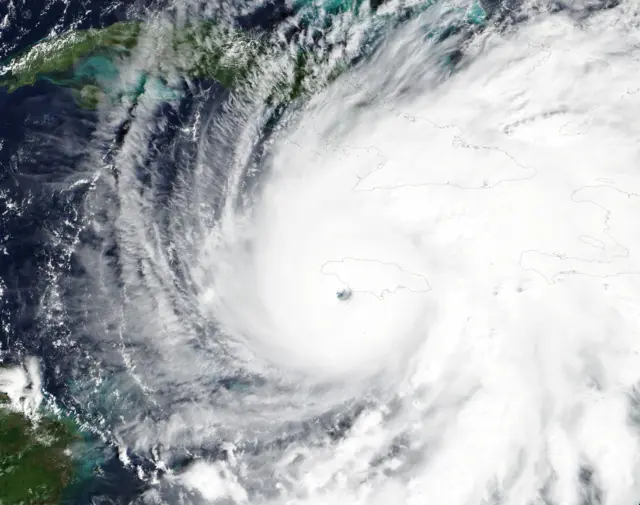 Image source, EPA
Image source, EPAHurricane Melissa makes landfall in Jamaica on 28 October 2025
The hurricane's force has been downgraded from a category five to a category four, but it is still lashing the island.
Catastrophic winds up to 150mph (240km/h), flash flooding, and a dangerous storm surge are ongoing, the National Hurricane Center says.
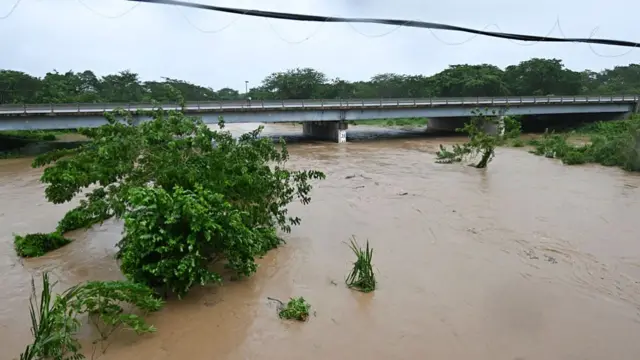 Image source, AFP via Getty Images
Image source, AFP via Getty ImagesThe Rio Cobre flowing out of its banks near St. Catherine, Jamaica
Shortly before Melissa made landfall, Jamaica's electricity provider JPS said that over a third of its customers were without power, mostly in the west, and outage reports were still increasing.
In the last hour, JPS posted an update - it doesn't offer specific numbers but says, "We know many of you are without power. We see you. We hear you".
Meanwhile, roads continue to flood and waterways are overflowing.
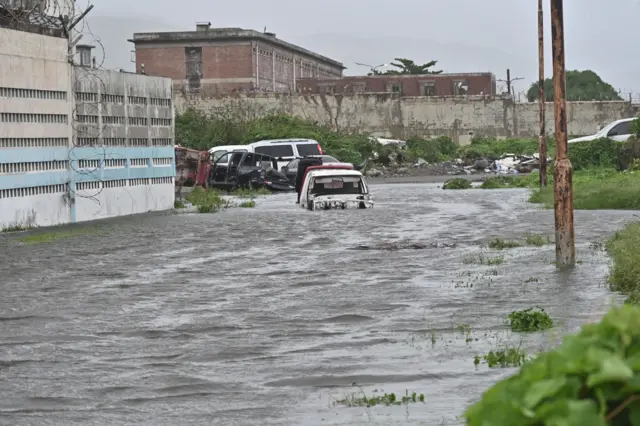 Image source, EPA/Shutterstock
Image source, EPA/ShutterstockA flooded road in Kingston
Photos taken from the last few hours show the damage the hurricane is inflicting as it makes landfall.
We'll bring you more photos as they emerge.
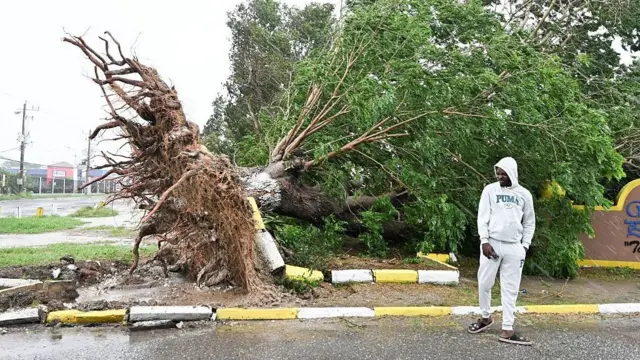 Image source, Getty Images
Image source, Getty ImagesA man looks at a fallen tree in St Catherine, Jamaica
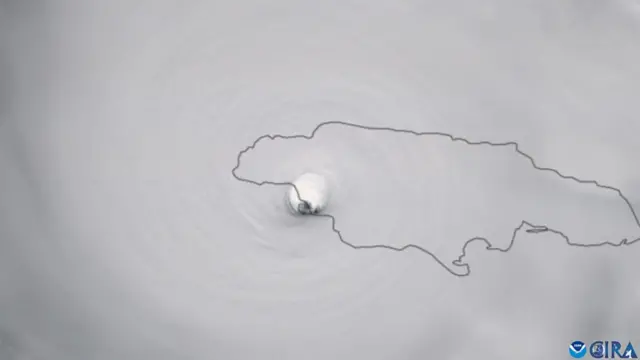 Image source, Getty Images
Image source, Getty ImagesAll of Jamaica is now covered by clouds, blocking the satellite view
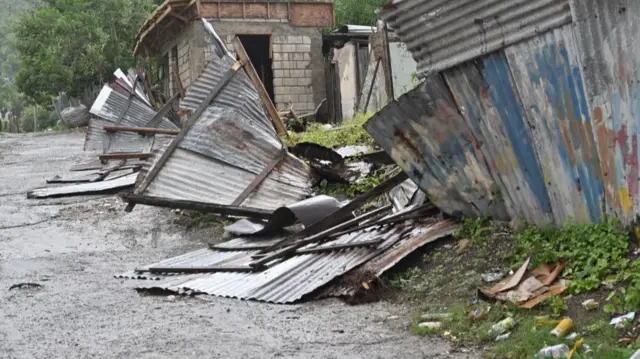 Image source, EPA
Image source, EPAA damaged home and fence seen in Kingston
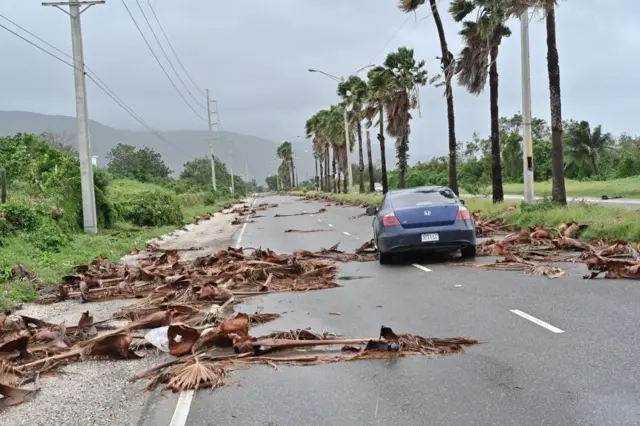 Image source, EPA
Image source, EPAPalm fronds blown down by wind seen strewn around the roadway
Official warnings about the storm haven't changed more than two hours after it made landfall.
The latest alert from the US National Hurricane Center shows the hurricane is still bringing "catastrophic winds, flash flooding and storm surges" to Jamaica and warns people to continue sheltering in place.
The centre of the storm has moved to the north coast near the tourist resort town of Montego Bay, and the sustained wind speed has dropped to 160 mph (260km/h), down from 185 mph when it made landfall.
To protect yourself, the NHC says you should avoid falling trees and "put as many walls as possible between you and the outside."
"You can cover yourself with a mattress and wear a helmet for added protection," it adds.
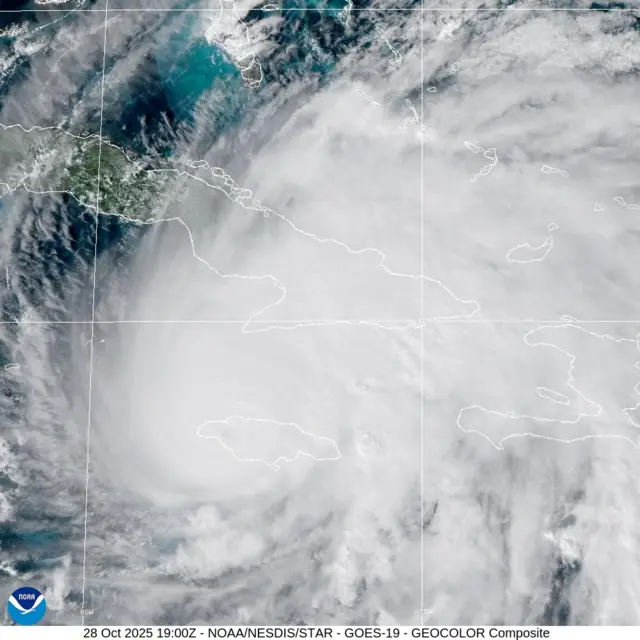 Image source, National Hurricane Center
Image source, National Hurricane CenterMary Litchfield
UGC & Investigations
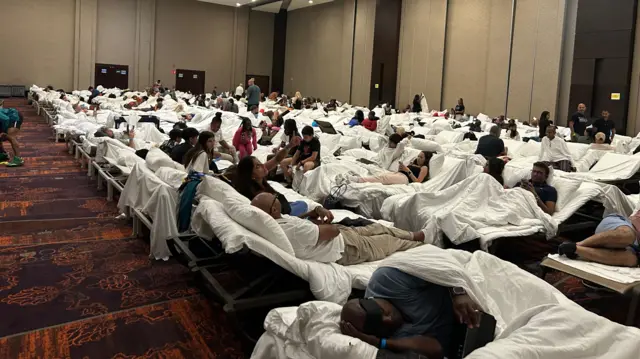 Image source, George Chac
Image source, George ChacPeople shelter on cots in an event room at the Moon Palace Resort
With his flight home yesterday cancelled because of the storm, an American traveller and his family are now huddled in a Jamaican hotel shelter.
George Chac from Phoenix, Arizona arrived to Ocho Rios, a town on the north coast of Jamaica, last week. Now, he's sheltering in a communal room at the Moon Palace Resort with dozens of others.
"The prepping and waiting has been a roller coaster of emotions. A lot of anxiety," he said. "We just wish it would get on with it and be over instead of looming over us like it is."
Staff has been staying at the hotel attending to guests instead of with their own families, he said.
 Image source, George Chac
Image source, George ChacChac's daughter
The US Department of State has sent out a warning to American travellers as Hurricane Melissa hits: get out if you can or take cover.
"If you’re in an area projected to be in the storm's path, depart ASAP if still possible. Americans who decide to remain should make preparations to shelter in place," said a notice put out on the department's social media.
They encouraged citizens in the storm's path to register with their Smart Traveler Enrollment platform so US embassies can contact them and their emergency contacts.
